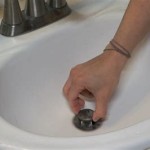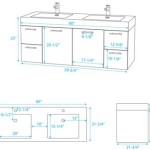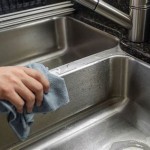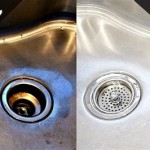Kitchen Sink Gurgles When Washer Drains: Understanding and Addressing the Issue
A gurgling kitchen sink when the washing machine drains is a common household plumbing problem. This symptom indicates a disruption in the drainage system, often stemming from a pressure imbalance within the pipes. Understanding the underlying causes and how to address them is crucial for preventing potentially larger plumbing issues and maintaining a functional and healthy home.
The pressure imbalance occurs because the washing machine rapidly expels a large volume of water. This sudden surge creates a demand for air within the drainage system. If the system is unable to adequately vent, the water draining from the washing machine can pull air from other connected fixtures, most commonly the kitchen sink. This "air being pulled" manifests as the characteristic gurgling sound. Left unaddressed, this issue can lead to slow drainage, unpleasant odors, and, in severe cases, sewage backup.
Several factors can contribute to this venting problem, ranging from simple obstructions to more complex design flaws within the plumbing system. A thorough investigation is necessary to pinpoint the root cause and implement an effective solution. Ignoring the problem will not make it disappear; it will likely worsen over time, potentially leading to more costly repairs.
Identifying Common Causes of Sink Gurgling
Several issues are frequently associated with a kitchen sink gurgling when the washing machine drains. Accurately identifying the cause is the first step in resolving the problem. This often requires a process of elimination, starting with the simplest and most readily accessible possibilities.
One of the most common culprits is a clog in the drainage system. This clog could be located anywhere from the drainpipe under the kitchen sink to the main sewer line. Over time, grease, hair, food particles, and other debris can accumulate and restrict the flow of water. When the washing machine drains, the backed-up water creates a pressure imbalance, leading to the gurgling sound. The location of the clog influences the severity of the gurgling and the overall drainage efficiency of the connected fixtures.
Another potential cause is a blocked vent pipe. Vent pipes are crucial for maintaining proper air pressure within the plumbing system. These pipes typically extend from the drainage system through the roof of the house, allowing air to enter the pipes and prevent a vacuum from forming. If a vent pipe is blocked by leaves, debris, or even a bird's nest, it can disrupt the airflow and cause the kitchen sink to gurgle when the washing machine drains. This blockage prevents the system from breathing properly, creating a negative pressure that pulls air from the sink.
A partial or complete collapse of the drain line underground can also create a significant obstruction. This is more common in older homes with outdated plumbing materials. Over time, pipes can corrode, crack, or even collapse due to soil shifting or root intrusion. A collapsed drain line severely restricts the flow of water and greatly exacerbates pressure imbalances, leading to pronounced gurgling and potential backups.
Improper plumbing installation is another potential contributing factor. If the plumbing system was not installed correctly, with adequate venting and proper pipe slopes, it can be prone to drainage problems and gurgling. This can stem from undersized drain lines, inadequate venting, or improper connections that impede water flow. Addressing this requires a comprehensive evaluation of the plumbing system by a qualified professional.
Troubleshooting Steps and Potential Solutions
Once the potential causes have been identified, a systematic approach to troubleshooting and implementing solutions is essential. Start with the simplest and most accessible solutions before resorting to more complex or costly interventions.
The first step is to check the kitchen sink drain for any visible obstructions. Remove the drain strainer and inspect the drain opening for hair, food debris, or other visible clogs. Use a pair of pliers or a bent wire to remove any obstructions that are within reach. Following this, pour a generous amount of boiling water down the drain to help flush out any remaining debris. This simple step can often resolve minor clogs that are causing the gurgling.
Next, consider using a plunger to dislodge any deeper clogs. Ensure that there is enough water in the sink to cover the cup of the plunger completely. Create a tight seal around the drain opening with the plunger and use vigorous up-and-down motions to create pressure and suction. Repeat this process several times. If the water begins to drain more freely, the clog may have been dislodged. Continue plunging until the sink drains smoothly.
If plunging is ineffective, try using a drain snake, also known as an auger. This tool consists of a flexible metal cable with a corkscrew-shaped tip. Insert the drain snake into the drain opening and carefully feed it down the pipe. As you rotate the handle, the tip of the snake will break up or snag any clogs that it encounters. Once you feel resistance, continue rotating the snake to loosen the clog. Carefully remove the snake, along with any debris that it has collected. Repeat this process until the drain is clear.
To address a potential vent pipe blockage, inspect the vent pipe on the roof of the house. This is often best done with the assistance of another person for safety purposes. Use a ladder to access the roof and carefully inspect the vent pipe opening. Remove any leaves, debris, or other obstructions that are visible. If the vent pipe is blocked by a bird's nest or other large object, it may be necessary to use a garden hose to flush it out. Be cautious when working on the roof and take all necessary safety precautions.
If the problem persists after trying these troubleshooting steps, it may indicate a more complex issue that requires professional assistance. A licensed plumber has the expertise and equipment to diagnose and resolve more challenging plumbing problems, such as collapsed drain lines or improperly installed plumbing.
Preventing Future Plumbing Problems
Preventing future plumbing problems is crucial for maintaining a healthy and functional home. Implementing proactive measures can minimize the risk of clogs, venting issues, and other drainage problems that can lead to gurgling sinks and other plumbing issues.
One of the most effective preventative measures is to avoid pouring grease down the drain. Grease solidifies as it cools, creating a sticky residue that can accumulate and cause clogs. Instead of pouring grease down the drain, collect it in a container and dispose of it properly. Similarly, avoid flushing food scraps down the toilet, as these can also contribute to clogs. Use a garbage disposal sparingly and only for small amounts of food waste.
Regularly flush the drain lines with hot water to help prevent the buildup of grease and other debris. Periodically pour a pot of boiling water down the kitchen sink drain to help dissolve any accumulated residue. Additionally, consider using a drain cleaner periodically to help maintain clear drain lines. Choose a drain cleaner that is specifically designed for your type of plumbing and follow the instructions carefully. Avoid using harsh chemicals that can damage the pipes.
Install screens or strainers in all of the drains to catch hair, food scraps, and other debris. These simple devices can prevent large objects from entering the drain lines and causing clogs. Clean the screens or strainers regularly to remove any accumulated debris. This simple step can significantly reduce the risk of clogs.
Have the plumbing system inspected regularly by a qualified plumber. A professional plumber can identify potential problems before they become major issues. They can also perform preventative maintenance, such as cleaning the drain lines and inspecting the vent pipes, to ensure that the plumbing system is functioning properly. Regular maintenance can extend the lifespan of the plumbing system and prevent costly repairs.
By understanding the causes of a gurgling kitchen sink when the washing machine drains and taking proactive steps to prevent plumbing problems, homeowners can maintain a functional and healthy home environment. This proactive approach will minimize the inconvenience and expense associated with plumbing repairs and ensure that the plumbing system continues to function smoothly for years to come.

How To Stop Sink Gurgling When Washing Machine Drains Page 1 Homes Gardens And Diy Pistonheads Uk

A Plumber Shows How To Solve Gurgling Noise From Sink Drain

Why Does My Sink Gurgle When Washing Machine Drains Atlanta Ga Plumbers

Solving Gurgling Drains Why Does My Kitchen Drain Gurgle And How To Fix It Babe S Plumbing Inc

Here S Why Your Kitchen Sink Gurgles And How To Fix It

Why Is My Kitchen Sink Gurgling Zimmerman Hvac

Washing Machine Draining Causes Sinks And Toilet To Gurgle How Fix

How To Stop Sink Gurgling When Washing Machine Drains Page 1 Homes Gardens And Diy Pistonheads Uk

Why Is My Kitchen Sink Gurgling

Why Does My Sink Gurgle When I Flush Bassett Services







